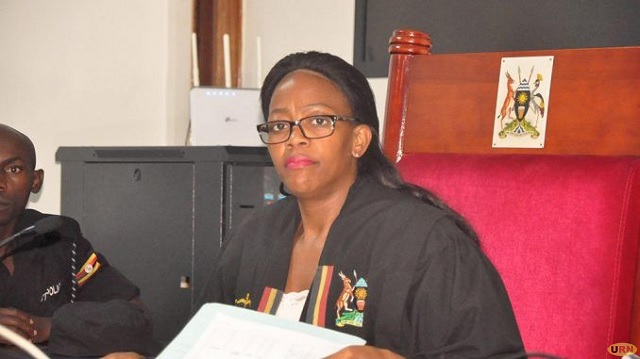
Kampala, Uganda | THE INDEPENDENT | For some, the sentences and penalties by Chief Magistrate Gladys Kamasanyu Musenze of the Standards Wildlife and Utilities Court are harsh and ruthless even for wildlife criminals like poachers and traffickers.
But Kamasanyu is becoming a darling for those fighting Wildlife crime in the region and internationally. She has been hailed for demonstrating that courts can play an important role in countering wildlife crime.
While others judge magistrates and lawyers are particularly recognized in the areas of human rights, Gladys Kamasanyu’s fame comes from the tough sentences she has handed notorious transnational wildlife traffickers. Those that have worked with her, testify that she understands that the crimes committed against wildlife must be taken seriously.
“One of the principles in our constitution is that justice must not be delayed. And Justice must be done for all. And for me, to all means to animals as well. Much as they don’t speak to say that I am hurt, they do expect justice,” Kamasanyu said in a recent interview with the Wildlife Trafficking Investigators Program in Gaborone, where she was one of the experts at an event hosted by the International Law Enforcement Academy.
Her assertion begs a question: Do wildlife feel pain when being poached? URN recently interviewed a poacher based at Queen Elizabeth National Park. While he asked for anonymity, he confirmed the fact that animals die in pain.
“It dies crying like a human being… If they were talking, you would even hear the way they cry. But we don’t know their language.”
That answer is perhaps the reason Gladys Kamasanyu’s motto is; “Animals Don’t Speak-Let Us Speak for Them,” So when she speaks by handing down heavy penalties and longer jail sentences, she is not only speaking for the animals but for humanity.
“It is a choice that I personally took and I want to stand out to be counted as one that did the right thing,” she said. “You can’t have a tusk of an elephant, and the elephant stays alive. To get it, the elephant has to die, has to be slaughtered, a huge elephant slaughtered for only their own and insist on their own tusks,” Kamasanyu. stated.
Uganda had in the early 2000s’ registered a surge in Illegal wildlife trade and trafficking masterminded by transnational criminals. The Convention on International Trade in Endangered Species of Wild Fauna and Flora, or CITES in 2013 ranked Uganda as one of the countries in Africa where a lot of trafficking in wildlife was taking place. The CITES secretariat then estimates illegal wildlife trade generates USD 20 billion annually.
Recent monitoring reports have observed a positive development in terms of the proportion of illegally killed elephants in Uganda compared to other countries in Africa. One such report found that while the proportion of illegally killed elephants fell by 30 per cent in other African countries, Uganda has had a three-fold reduction or 90 per cent since it peaked. For many, the fall may be partly attributed to the efforts of the likes of Gladys Kamasanyu.
She has since 2016 been working behind the scenes or in public trying to strengthen the monitoring of wildlife crime and the prosecution of traffickers. She is also one of the brains that led to the establishment of the Standards, Wildlife, and Utilities Court by advising the judiciary on how best the Court could operate. The court has been operating since May 2017 as the only specialized court in Africa where judicial officers are stationed at a court to hear cases that used not to be heard.
She observes that with no victim, and no complainant, wildlife-related cases used to be at the bottom of the agenda of the court because the morale to have cases fast-tracked was low.
“The cases we are talking about don’t have a victim that we see, they don’t have a complainant that will come to the police to report a case that will insist and seek for justice, that will be in a courtroom to give evidence, that will be in pain and we visibly see. Usually, when the cases are reported, it will be too late, too late to save a life.”
Records from the judiciary indicate that over 2,000 wildlife-related cases have been adjudicated since the establishment of The Utilities, Standards, and Wildlife Court. One such case was concluded on Thursday when the magistrate handed warrant officer, David Okot a five million Shillings fine or a two-year jail sentence for unlawful possession of six ostrich eggs.
She observed that if nothing is done to check the crime, the country risks losing all the wildlife, which will come with all consequences of not having wildlife not only to Uganda but to the whole World. In April 2022, Kamasanyu sentenced a Congolese national Bob Mbaya Kabono to seven years in jail after finding him guilty of unlawful possession of protected wildlife species.
And in October 2022, Gladys Kamasanyu sentenced Pascal Ochiba to life in prison for the illegal possession of two pieces of ivory weighing about 10 kilograms. She has applied the Uganda Wildlife Act, the National Forestry and tree Planting Act and the Fisheries Act and the new National Environment Act to pass down punishments not only to poachers, wildlife traffickers, and those involved in environmental crime.
Wildlife crime according to Kamasanyu ceased to be a domestic problem but a challenge that affects the entire world. With the court functioning as envisaged, the presence of judicial officers like Kamasanyu, and good monitoring and prosecution of cases, the Uganda Wildlife Authority (UWA), and other conservation groups feel Uganda is on the right path toward ensuring justice for wildlife.
“We have made the ground too risky for people to come and think that they are going to use Uganda for wildlife trafficking,” said Bahir Hangi, the Communication Manager at UWA. Despite partly being part of this success, Gladys Kamasanyu is not yet satisfied especially each time she learns of an elephant tusk and pangolin scales seizures.
“We have a lot of inflow of ivory, and pangolin scales even when we are not reporting deaths or carcasses of elephants in our national parks. That means that there is a lot of ivory entering Uganda” she said
Kamasanyu is also the founder of Help African Animals which protects animals through the legal system by raising awareness and building capacity about wildlife crime and other crimes against animals, their nature and effect, the laws protecting animals and penalties for violation of the laws.
Wildlife trafficking destroys the earth and pushes endangered species toward extinction. This crime was thriving because of the limited capacity of law enforcement, weak courts, and widespread corruption.
*****
URN
 The Independent Uganda: You get the Truth we Pay the Price
The Independent Uganda: You get the Truth we Pay the Price


